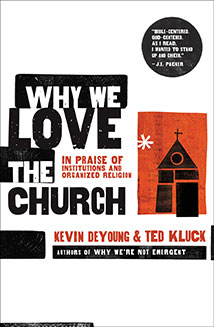 Perhaps you overheard the conversation. The gentleman sitting across from you, whom you’ve never met, is telling his co-worker the list of reasons why he’s leaving his church in order to express his faith in a more “genuine” way.
Perhaps you overheard the conversation. The gentleman sitting across from you, whom you’ve never met, is telling his co-worker the list of reasons why he’s leaving his church in order to express his faith in a more “genuine” way.
Soon, you discover the root issue beneath his argument: He wants fellowship without commitment and he wants to learn without being taught by anyone. Sound familiar?
After all, the bombardment of recent books—Life After Church, Quitting Church, and They Like Jesus but Not the Church—have taught us that church is archaic. The revolution to come—or already underway—will see Christians abandon the institutional church in favor of expressions that are more individualistic. But are these “experts” spot-on in predicting the future or, perhaps, are their views of the local church too low?
These are some of the reasons that led me to read Why We Love the Church by Kevin DeYoung and Ted Kluck. You may recognize these authors from their first book, Why We’re Not Emergent, a resource that won Christianity Today’s 2009 Book Award in the Church/Pastoral Leadership category. Together, these two authors team-up and provide a wonderful resource for churches—especially those that we’ve grown to love.
This book is written for four kinds of people: the committed, the disgruntled, the waffling, and the disconnected. For the committed, DeYoung and Kluck aim to spur them on to keep working hard and ministering steadily in their local church, providing thoughtful responses to disillusioned former churchgoers.
To the other three groups—the disgruntled, the waffling, and the disconnected—the authors provide four reasons that people are disillusioned with the church: the missiological (the church is failing, impotent, and it’s time for something completely different); the personal (the church is filled with hypocrites, antigay, and unloving “Christians” who have an image problem that desperately needs to be fixed); the historical (the church, as we know it in the West, has been corrupted by paganism and not saturated in the Scriptures); the theological (the organizational, institutional, hierarchical, programmatic, weekly services view of the church, it is said, are completely foreign to the Bible). Throughout the book, DeYoung and Kluck respond to these reasons and (faulty) rationales, equipping “the committed” with an apologetical understanding for the church.
Perhaps the most significant parts in the book pertain to how the church is central to all God is doing in and throughout the world, through—and not apart from, His local church. The authors rightly assert that a Christian is expected to participate with a local body of believers, and we should not expect a person who deliberately remains outside the visible church to be a true follower of Christ.
So, if you’re eager to engage in these discussions, pick up a copy of Why We Love the Church. I’m confident you’ll benefit, walking away with a greater love for Christ and His church.
